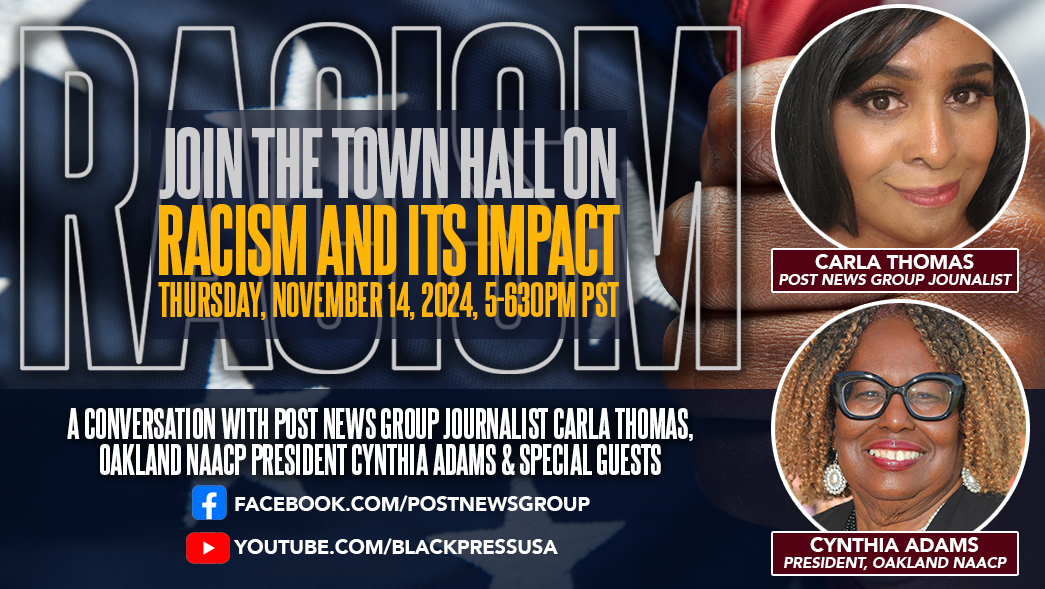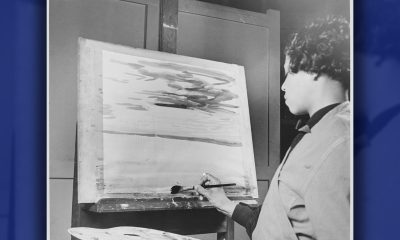Business
Documentary Shows An Old Profession In A New Way
THE AFRO — Founder and CEO of the Bennett Career Institute Chet A. Bennett and filmmaker Kester Browne teamed up to create a documentary highlighting a vibrant career path in a timeless profession – barbering.
By George Kevin Jordan
Last year D.C. made the news when the Economic Policy Institute released a report that stated that unemployment for African Americans in the District was the highest in the nation. Finding gainful employment, let alone a career, in the District can be hard. And returning citizens from the prison system face greater risk of unemployment and recidivism.
Founder and CEO of the Bennett Career Institute Chet A. Bennett and filmmaker Kester Browne teamed up to create a documentary highlighting a vibrant career path in a timeless profession – barbering.
“Don’t Put down the Clippers” follows several formerly incarcerated people as they look back on their life and the impact the barber and beauty industry had on it.
Back in 1998 while teaching cosmetology and barbering at the Correctional Treatment Facility in D.C., Bennett noticed a pattern of men in the prison system who learned or continued learning about barbering.
“Once I started seeing the impact of what the barbering and cosmetology industry can do, I thought, ‘Hey why not document guys in the beauty industry that never put down the clippers and they’re doing a lot of amazing things in society that a lot of people have no clue,’” Bennett said. “That someone learned the trade while incarcerated, and how it easy it was for them to get a job, and land back on their feet because they can make instant money.”
Bennett said he would run into several men who came back to him after leaving his cosmetology school.
“They will call me months after they got out and say, ‘Mr. Bennet I want you to see my house,’ or ‘I want you to see my car,’ which was major for them because of what they were doing the last twenty years,” Bennett told the AFRO. “So I felt like this should be something where America can look at our barber industry form another angle.”
The documentary pulls interviews from former and current students of the Bennett Career Institute (BCI), 700 Monroe Street NE, which trains people in all aspects of the beauty industry from barbers, cosmetologists, estheticians, to make up artists. BCI was established in 1996.
For Eric Justice Bethea, 48, his relationship with his clippers propelled him into a new life.
“My journey started in prison,” said Bethea, who said he spent 18 years, nine months and 3 days in various correctional facilities throughout Maryland. “I took up the trade solely because at first I wanted an activity to get me out of the cell and the activities that occurred at the tier.”
Bethea said he had been mulling over his career options saying, “my mindset was I had to get some type of craft, or some type of skill once I got out. I wasn’t exactly sure it was going to be barbering.”
When he was released from prison his surrogate mom, his aunt, sat him down at lunch and they discussed his options. She suggested barbering, which had been an idea swirling around in his head, he said. His aunt brought him to the Bennett Career Institute. He has been working at BCI since 2006.
Barbering gave Bethea a meaningful career, but it also opened the door to a higher calling.
“I use my barbering as a tool for mentoring,” Bethea said. He has spent the last several years going into prisons, detention centers, trade schools and charter schools, speaking to kids who may be considered “high risk” for the school to prison pipeline.
Over the last several years Bethea has mentored over 50 kids. He does it “because nobody did it for me,” he told the AFRO.
“All the things I try to offer youth, men or women, I wish someone did for me,” Bethea added.
Though Bethea does impart advice, it’s also the skills of barbering itself that can help young people and returning citizens claim a career and a purpose.
“Anywhere in the world- the one gift about being a barber is that it’s a trade you take anywhere,” Bethea said. “This is a process that does not require an application, an interview and different things that can discourage people from taking a job. If you have this skill you can relocate anywhere and start the process of cutting hair that exact same day,” he added.
“Some people don’t want to wait till later for their money. I am teaching youth to get money right now the legitimate way.”
The documentary uncovered some surprising information, like the fact that many returning citizens may be eligible for Pell Grants to continue their education. Also many people interviewed in the documentary point to barbering and the beauty industry as a viable career option.
Browne, who directed the film, initially heard about the project from a friend. He went in and interviewed and when Bennett told him the scope of the project, he immediately wanted to do.
“I thought, ‘Hey this is great. This is what I want to do,’” Browne said. The film took about two months to complete. Both he and Bennett are hoping to enter the film in festivals and premiere it throughout the year.
For Browne however, the opportunity to expand the film, and the number of voices is compelling.
“I would like to get more stories of people,” Browne said. “Travel around. I am sure there are people around the country that have similar stories.”
To view the trailer and discover more information about the documentary go to the BCI site https://www.bennettcareerinstitute.org/make-up-artistry.
This article originally appeared in The Afro.
Activism
Oakland Post: Week of November 20 – 26, 2024
The printed Weekly Edition of the Oakland Post: Week of November 20 – 26, 2024

To enlarge your view of this issue, use the slider, magnifying glass icon or full page icon in the lower right corner of the browser window. ![]()
Activism
Oakland Post: Week of November 13 – 19, 2024
The printed Weekly Edition of the Oakland Post: Week of November 13 – 19, 2024

To enlarge your view of this issue, use the slider, magnifying glass icon or full page icon in the lower right corner of the browser window. ![]()
Activism
LIVE! — TOWN HALL ON RACISM AND ITS IMPACT — THURS. 11.14.24 5PM PST
Join us for a LIVE Virtual Town Hall on the Impact of Racism hosted by Post News Group Journalist Carla Thomas and featuring Oakland, CA NAACP President Cynthia Adams & other Special Guests.
Thursday, November 14, 2024, 5 p.m. – 6:30 p.m. PST


Join us for a LIVE Virtual Town Hall on the Impact of Racism hosted by Post News Group Journalist Carla Thomas and featuring Oakland, CA NAACP President Cynthia Adams & other Special Guests.
Thursday, November 14, 2024
5 p.m. – 6:30 p.m. PST
Discussion Topics:
• Since the pandemic, what battles have the NAACP fought nationally, and how have they impacted us locally?
• What trends are you seeing concerning Racism? Is it more covert or overt?
• What are the top 5 issues resulting from racism in our communities?
• How do racial and other types of discrimination impact local communities?
• What are the most effective ways our community can combat racism and hate?
Your questions and comments will be shared LIVE with the moderators and viewers during the broadcast.
STREAMED LIVE!
FACEBOOK: facebook.com/PostNewsGroup
YOUTUBE: youtube.com/blackpressusatv
X: twitter.com/blackpressusa
-

 Alameda County4 weeks ago
Alameda County4 weeks agoAlameda County District Attorney Pamela Price Announces $7.5 Million Settlement Agreement with Walmart
-

 Activism3 weeks ago
Activism3 weeks ago‘Jim Crow Was and Remains Real in Alameda County (and) It Is What We Are Challenging and Trying to Fix Every Day,’ Says D.A. Pamela Price
-

 Bay Area4 weeks ago
Bay Area4 weeks agoIn the City Attorney Race, Ryan Richardson Is Better for Oakland
-

 Activism3 weeks ago
Activism3 weeks agoOakland Post: Week of October 30 – November 5, 2024
-

 Alameda County3 weeks ago
Alameda County3 weeks agoD.A. Price Charges Coliseum Flea Market Vendors in Organized Retail Theft Case
-

 Activism3 weeks ago
Activism3 weeks ago‘Criminal Justice Reform Is the Signature Civil Rights Issue of Our Time,’ says D.A. Pamela Price
-

 Activism2 weeks ago
Activism2 weeks agoLIVE! — TOWN HALL ON RACISM AND ITS IMPACT — THURS. 11.14.24 5PM PST
-

 Activism4 weeks ago
Activism4 weeks ago“Two things can be true at once.” An Afro-Latina Voter Weighs in on Identity and Politics





















































